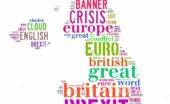Re The UN General Assembly Speaker Schedule is Here! I note that whoever will be speaking for Canada this year…
Wednesday Night #899
Written by Diana Thebaud Nicholson // May 26, 1999 // Reports, Wednesday Nights, Wednesday Nights Meta // Comments Off on Wednesday Night #899
The Report (photos and more)
This Wednesday’s invitation advertised “we have Misha Crnobrnja back from a very successful tour at William and Mary and just about to leave again for Macedonia. We look forward to hearing his usual informed opinion regarding the latest thinking in Washington regarding Kosovo, what is most likely to happen next and what the long-term results will be. It will be interesting also to hear his comments on the part of last week’s discussion focused on how to break the cycle of ethnic hatred.”
Bruce Burnett introduced his good friend and financial advisor, Daniel Valmont who “manages mismanaged money” at RBC.
Kosovo
The drama unfolding in the Balkans today represents a rerun of the tragic events that occurred throughout Europe two centuries ago. The various ethnic communities have co-existed for a millennium and under the successive rules of the Ottoman and Austro-Hungarian empires, there was no opportunity for the establishment of national identities. The ethnic groups in Europe do not accept the “melting pot” concept of the Americas; their interest is in preserving ethnic not national identities.
Albania became the least advanced country in Europe and Kosovo, the least developed country in Yugoslavia. The reign of Marshall Tito saw the paradoxical development of great freedom without any hint of democracy, greatest religious tolerance in the absence of any hint of political freedom. Members of the various ethnic communities intermarried and lived together in peace, although to a much lesser extent in Kosovo where language differences separated the two ethnic groups. The Serb community grew into a majority in Kosovo (a situation which was until recently reversed). With the void created by Tito’s death, exploitation of ethnic differences, real or imagined for political purposes in an attempt to establish nationalism along ethnic lines, has resulted in the carnage we have witnessed in Yugoslavia in this decade. This is the scenario establishing national identities that was first played out in the rest of Europe two centuries ago and was considered quite acceptable at the time.
Misha takes exception to the reporting which emphasizes a millennium-long hatred imbedded in the collective psyche and reminds us that the Kosovo issue is only 80 years old. The legal right is with the Serbs while the factual right is with the Albanians. The two sides will not look beyond ethnic identity to civil identity. When Albania became a state in 1914, the Albanians believed that they would “own” Kosovo; then the Serbs marched back in and remained in power until ’41. After which the Albanians revenged themselves (they never accepted Tito’s partisans). Following the Constitution of ’74, the Albanians had virtual independence within Yugoslavia, but the Kosovars are never happy.
However noble the objective, NATO has acted without authorization from the United Nations. This is understandable considering the difficulties involved in obtaining such authorization from the Security Council, in the face of Russian and Chinese opposition. The Chinese are in the polar position. China cannot accept the Wilsonian view of sovereignty and the obligations of the collectivity of nations and therefore must cast a veto. So the UN was not a viable alternative.
NATO is now in the position of playing the role of Judge, Jury, Prosecutor and Policeman, a potentially dangerous situation. It is to be hoped that the role is taken seriously and played evenly.
Was the air campaign without risking ground troops a blunder?
Clinton is not a leader, he is a survivor. All agree that ethnic cleansing is intolerable, but the conduct of this war is wrong. The objectives are not clearly defined. Without knowledge of the reasons for NATO strategy, it appears as if, instead of setting objectives and leaving it to the military to decide how to attain them, there is overriding political input into the military campaign. It may very well be that the bombing meant to destabilize Milosevic and stabilize the region has achieved the reverse.
Was the bombing of the Chinese embassy in Belgrade an inadvertent gift to the government of China, permitting them to deflect attention from civic discontent and unrest? It appears as if NATO has given China all the advantages at no cost.
Did the announcement of the indictment of Slobodan Milosevic exacerbate an already sticky problem? Is this a prelude to his assassination?
At present it appears that Milosevic still has considerable popular support. National pride is at stake. Serbs feel that they are being unduly punished by the bombing. Serbs also believe that the Hague tribunal is a farce. Milosevic cannot of course be tried until he is arrested.
Can NATO negotiate with him now that he has been branded a war criminal?
The indictment precipitates a continuation of the war as Milosevic has nothing to gain from negotiating and nothing to lose by pursuing his current policy, but it also may well provoke civil war within Serbia. Is the indictment a prelude to targeting him personally? He cannot be tried until he has been arrested – will the U.S. and U.K. put in an SAS team to bring him out? Finally, why did Louise Arbour choose this moment to make it public? She could have kept it secret. Does this mean that she is sending a signal to the Prime Minister that she would not accept a nomination to the Supreme Court at this time?
In negotiating a peace agreement, is Russia enhancing its own image while getting NATO countries off the hook. Does this process come at a price both NATO and Russia are prepared to pay?
Water
The sale of Canadian fresh water to the United States was introduced with mention of the Newfoundland entrepreneur who has contracted to deliver $30 million of water overseas by tanker.
Can a private citizen do this? Doesn’t the Federal government have authority over fresh water? The transfer of water has political consequences and this case is not like the sale of hydro electricity by the crown corporations which have a mandate to sell energy. There is concern that this undertaking may trigger NAFTA. The energy policy of the NAFTA agreement provides for “rights of established treatment” – the U.S. must accept that Canadian requirements come first. Canada cannot be deprived of energy in order to meet a quota for sale to a foreign interest .
Water cannot be equated to mineral rights either. Draining our lakes is a very different matter.
In contrast to previous discussions of this topic and possibly because there were several economists present, the majority appeared to be in favor of selling water in the interest of eliminating our debt.
There is still no consensus, however.
Aviation
The Transportation Safety Board report on the Air Canada crash in New Brunswick has been widely misreported and misquoted in the media. The crash was not attributable to pilot error. The Board attributed the accident to “a series of events”. There were 9 people injured not 30. The movement for a Passenger Bill of Rights is interesting. Airlines will have to emphasize competitivity in service rather than price. People will pay a premium for good service. At present there is more supply than demand (therefore the Canadian Airline losses). There is a valid question whether deregulation has been properly implemented. As the hub and spoke system has proven to be a barrier to competition in the States, there may well be a need to re-regulate.
At the same time, the issue of privatisation (devolution) of airports in Canada should also be revisited, especially with reference to Pearson airport. A subject for another Wednesday.



